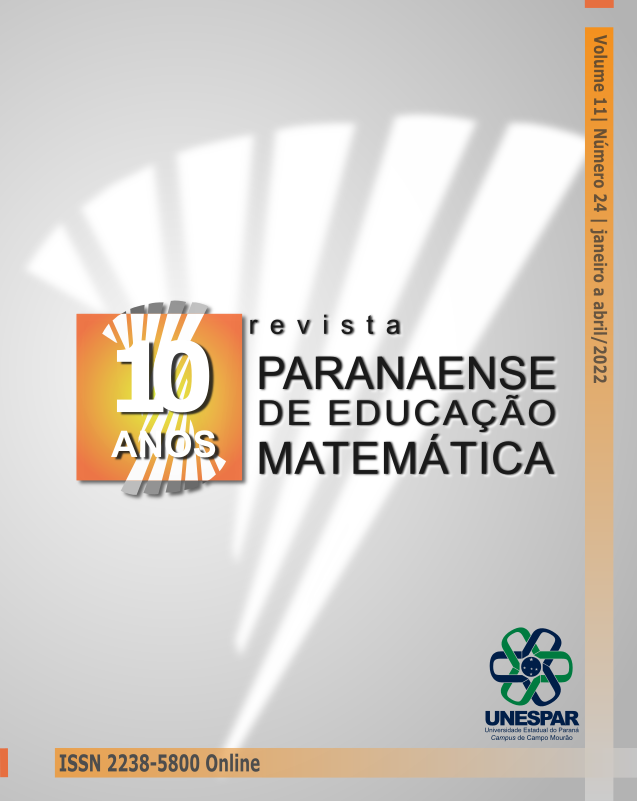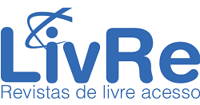CRIAÇÃO DE UMA NOVA DISCIPLINA COMO INTERVENÇÃO: ALTERNATIVA METODOLÓGICA NA AULA DE MATEMÁTICA
Abstract
This article, on some selected results from a finalized doctoral research, aims to analyze the contributions of an intervention made to facilitate the identification of articulations between different school disciplines in a full time school. In this, we discuss some challenges encountered during development of the mentioned research and the methodological alternatives used to face them. The discussion is supported by references from Activity Theory, more specifically, it is backed up by the appropriations of this theory made by the group led by the researcher Yrjö Engeström. It is based on the results of a research carried out in a federal full time public school, in a 7th grade class of an elementary school, in Belo Horizonte, focusing on the work developed in the disciplines Mathematics and Differentiated Work Groups (GTD). The methodological procedures employed were: observation in the classroom, interviews (with students, teachers and monitor) and creation of a new discipline as a form of intervention. The results show that the intervention contributed to the characterization of reverberations from a GTD on multiplication and division of fractions in the Mathematics classes, thus showing the possibility of creating articulations between different disciplines, in full time schools. They also show that the consequences of these reverberations, in the actions of two students, favored the work developed in mathematics classes, contributing to the beginning of expansive learning processes. However, they suggest as well that, in certain situations, the reverberations can result as losses for the course of the classes, leading students to lose the focus on the activity they were supposed to be tuned into.
Downloads
References
ALGEBAILE, E. Escola pública e pobreza no Brasil: A ampliação para menos. Rio de Janeiro: Lamparina, 2009.
ALVES-MAZZOTTI, A. J. O Método nas Ciências Sociais. In: A. J. ALVES-MAZZOTTI; F. GEWANDSZNAJDER (Org.). O Método nas Ciências Naturais e Sociais: Pesquisa Quantitativa e Qualitativa. São Paulo: Pioneira Thomson Learning, 2001, p.108-203.
AQUINO, O. F. Leonid Vladmirovitch Zankov: contribuições para a pesquisa em didática desenvolvimental. In: LONGAREZI, A.M; PUENTES, R.V (Org.). Ensino Desenvolvimental: vida, pensamento e obra dos principais representantes russos. Uberlândia: EDUFU, 2015, p.245-273.
ARAÚJO, J.; CAMPOS, I.; CAMELO, F. Pesquisar o que poderia ser: uma interpretação dialética para a relação entre prática pedagógica e pesquisa segundo a educação Matemática crítica. In: D’AMBROSIO, B; LOPES, C. E. (Org.). Vertentes da Subversão na Produção Científica em Educação Matemática. Campinas: Mercado das Letras, 2015, p.43-62.
ARAÚJO, J. L.; KAWASAKI, T. F. Movimento e Rigidez de Certo Triângulo: um Enfoque Histórico-Cultural em Pesquisas em Educação Matemática. In: ENCONTRO NACIONAL DE EDUCAÇÃO MATEMÁTICA, 11., 2013, Curitiba. Anais [...]. Curitiba: SBEM/Paraná, 2013. p.1-13. Disponível em: http://sbem.iuri0094.hospedagemdesites.ws/anais/XIENEM/pdf/2617_2159_ID.pdf. Acesso em: 15 jun. 2021.
BOGDAN, R.; BIKLEN, S. Investigação qualitativa em educação: uma introdução à teoria e aos métodos. Porto: Porto Editora, 1994.
BRASIL. [Diretrizes Curriculares (2013)]. Diretrizes Curriculares Nacionais Gerais da Educação Básica. Brasília: Ministério da Educação, 2013. 565p. Disponível em: http://portal.mec.gov.br/index.php?option=com_docman&view=download&alias=15548-d-c-n-educacao-basica-nova-pdf&Itemid=30192 . Acesso em: 15 jun. 2021.
BRASIL. [Plano Nacional de Educação (2015)]. Plano Nacional de Educação 2014-2024. Brasília: INEP, 2015. 408p. Disponível em: http://pne.mec.gov.br/18-planos-subnacionais-de-educacao/543-plano-nacional-de-educacao-lei-n-13-005-2014. Acesso em: 22 jun. 2021.
BRASIL. [Emenda Constitucional (2016)]. Emenda Constitucional nº 95. Brasília, 2016. Disponível em: http://www.planalto.gov.br/ccivil_03/constituicao/Emendas/Emc/emc95.htm. Acesso em: 15 jun. 2021.
BUENO, F. S. Minidicionário da língua portuguesa. São Paulo: FTD, 1996.
CHAGAS, V. I. Eventos de letramento na Escola Integrada: uma perspectiva etnográfica. 2011. 165f. Dissertação (Mestrado em Educação) – Faculdade de Educação, Universidade Federal de São João del-Rei, São João Del-Rei, 2011.
DAVID, M. M.; TOMAZ, V. S. Researching Classrooms: historicity as a perspective to analyze a geometry class. In: PSYCHOLOGY OF MATHEMATICS EDUCATION, 33., 2009, Thessaloniki. Proceedings […]. Thessaloniki-Grecia: PME, 2009. p. 377-384.
DEODATO, A.A. Matemática do Projeto Escola Integrada: distanciamentos e aproximações entre as práticas das oficinas e as práticas da sala de aula.2012.185f. Dissertação (Mestrado em Educação) – Faculdade de Educação, Universidade Federal de Minas Gerais, Belo Horizonte, 2012.
DEODATO, A.A. Articulação entre Disciplinas de uma Escola de Tempo Integral: reverberações de um Grupo de Trabalho Diferenciado (GTD) nas aulas de Matemática. 2017.208f. Tese (Doutorado em Educação) – Faculdade de Educação, Universidade Federal de Minas Gerais, Belo Horizonte, 2017.
DOWNING-WILSON, D.; LECUSAY, R.; COLE, M. Design experimentation and mutual appropriation: Two strategies for university/community collaborative after-school interventions. Theory & Psychology, v. 21, n.5, p.656-680, 2011.
ENGESTRÖM, Y. Learning by expanding: an activity-theoretical approach to developmental research. Helsinki: Orienta-Konsultit, 1987.
ENGESTRÖM, Y. Non scolae sed vitae discimus: Toward overcoming the encapsulation of school learning. Learning and instruction, v. 1, n.3, p.243-259, 1991.
ENGESTRÖM, Y. Learning by expanding: Ten years after. Marburg: BdWi-Verlag, 1999.
ENGESTRÖM, Y.; SANNINO, A. Studies of expansive learning: Foundations, findings and future challenges. Educational Research Review, v. 5, n.1, p.1-24, 2010.
ENGESTRÖM, Y.; SANNINO, A. Discursive manifestations of contradictions in organizational change efforts: A methodological framework. Journal of Organizational Change Management, v. 24, n.3, p.368-387, 2011.
IMENES, L. M.; LELLIS, M. Matemática (7° ano). São Paulo: Editora Moderna, 2012.
LIBÂNEO, J. C. O dualismo perverso da escola pública brasileira: escola do conhecimento para os ricos, escola do acolhimento social para os pobres. Educação e Pesquisa, v. 38, n.1, p.13-28, 2012.
LIBÂNEO, J. C. Escola de tempo integral em questão: lugar de acolhimento social ou de ensino-aprendizagem? In: V. M. BARRA (Org.). Educação: ensino, espaço e tempo na escola de tempo integral. Goiânia: CEGRAF, 2014, p.4-39.
PEREYRA, M.A. La jornada escolar en Europa. Cuadernos de Pedagogia n° 206, Barcelona, 1992 apud Maurício, L.V. Jornada escolar ampliada: diferenças entre Europa e Brasil. In: MAURÍCIO, L.V. (Org.). Tempos e Espaços Escolares: experiências, políticas e debates no Brasil e no mundo. Rio de Janeiro: Ponteio. 2014, p.33-54.
TOMAZ, V.S; DAVID, M.M. How Students’ Everyday Situations Modify Classroom Mathematical Activity: The Case of Water Consumption. Journal for Research in Mathematics Education, v. 46, n.4, p.455-496, 2015.
TOMAZ, V. S. Práticas de transferência de aprendizagem situada em uma atividade interdisciplinar. 2007. 311f. Tese (Doutorado em Educação) – Faculdade de Educação, Universidade Federal de Minas Gerais, Belo Horizonte, 2007.
Downloads
Published
How to Cite
Issue
Section
License
Copyright (c) 2022 Revista Paranaense de Educação Matemática

This work is licensed under a Creative Commons Attribution-NonCommercial-NoDerivatives 4.0 International License.










